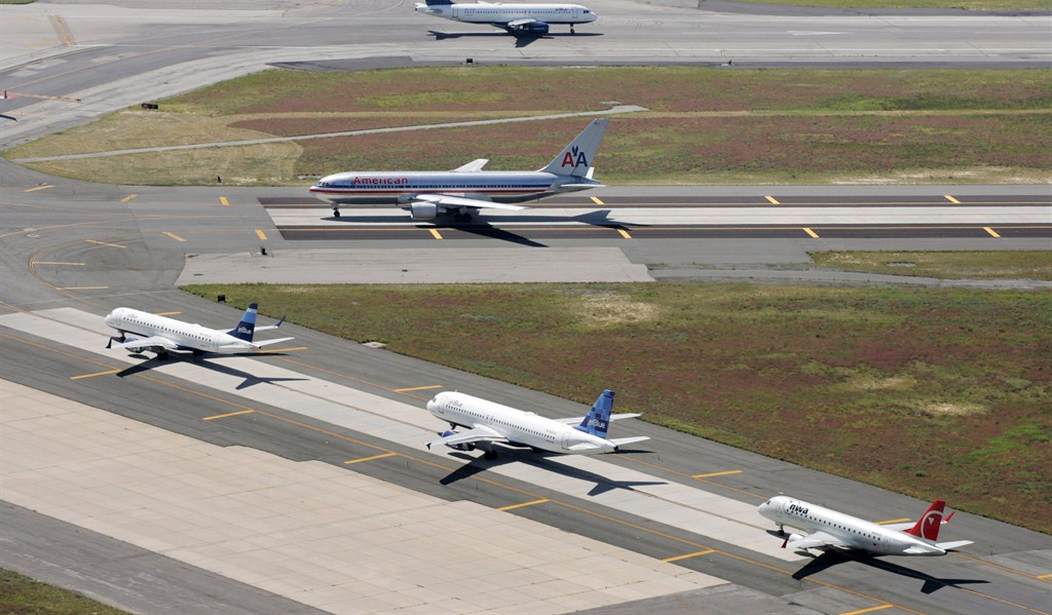No, you haven't been imagining it. The recent surge of reporting on "close calls" between passenger planes in the United States is not just a passing interest in air safety or a coincidence. Instead, it's the result of a significant number of nearly catastrophic incidents — 46 at least — that took place last month.
Now, we're learning more about the frequency and scope of these "close calls" thanks to reporting from The New York Times based on a review of undisclosed incident reports from the Federal Aviation Administration.
A few such incidents you may recall hearing about in July, as summarized by the Times:
On the afternoon of July 2, a Southwest Airlines pilot had to abort a landing at Louis Armstrong New Orleans International Airport. A Delta Air Lines 737 was preparing to take off on the same runway. The sudden maneuver avoided a possible collision by seconds.
Nine days later, in San Francisco, an American Airlines jet was accelerating down the runway at more than 160 miles per hour when it narrowly missed a Frontier Airlines plane whose nose had almost jutted into its path. Moments later, the same thing happened as a German airliner was taking off. In both cases, the planes came so close to hitting the Frontier aircraft that the Federal Aviation Administration, in internal records reviewed by The New York Times, described the encounters as “skin to skin.”
And two and a half weeks after that, an American flight to Dallas was traveling at more than 500 m.p.h. when a collision warning blared in the cockpit. An air traffic controller had mistakenly directed a United Airlines plane to fly dangerously close. The American pilot had to abruptly yank the Airbus A321 up 700 feet.
Recommended
And July is just one month-long snapshot. The Times also looked at a NASA database full of safety reports from those playing a role in such close calls: pilots, air traffic control, et al. The analysis of that database tuned up "about 300 accounts of near collisions involving commercial airlines."
After reviewing all these reports and records, the Times found that "incidents often occur at or near airports and are the result of human error," with "one major factor" being "[m]istakes by air traffic controllers" who are "stretched thin by a nationwide staffing shortage." That's one of the many crises that the Biden administration has not taken action to remedy, leading to flight delays and upended flight schedules in New York and D.C. as well as more mistakes and therefore reduced safety.
Given the Biden administration's track record — and specifically Transportation Secretary Pete Buttigieg's — in having foresight to deal with mounting problems before they become crises, it's likely that even the federal government is not on top of these close calls or working on mitigation plans.
Those working within America's air transportation system — and tasked with keeping it running smoothly and safely — are not too pleased with the increasingly dangerous status quo, according to those who spoke with the Times:
Aviation authorities say that the U.S. air travel system, which transports nearly three million passengers a day, is the safest in the world. But current and former air traffic controllers said in interviews that close calls were happening so frequently that they feared it was only a matter of time until a deadly crash occurred.
“Honestly, this stuff scares the crap out of me,” a longtime airline captain, who previously was a carrier fighter pilot, reported to NASA in November. An air traffic controller had cleared the pilot’s flight to land on what looked like “a collision course” with another passenger plane. (NASA redacts entries’ identifying details, such as the airlines and pilots’ names.)
“This has really opened my eyes to how the next aviation accident may play out,” another pilot wrote to NASA after a close call on a runway in January.
“Is it going to take people dying for something to move forward?” a controller wrote the same month after barely preventing a midair collision.
Sure, as the Times noted, "there have been no major U.S. plane crashes in more than a decade," but close calls and other "potentially dangerous incidents are occurring far more frequently than almost anyone realizes."
So, when is the Biden administration going to take the growing danger seriously — actually do something to remedy the issues such as the immediately addressable ATC staffing shortages? Perhaps firing controllers who chose not to get vaccinated, in the name of saving lives of course, wasn't the wisest move? It's time for Biden, Buttigieg, and the rest of the administration to do its job, triage the issues, and start picking them off one by one to ensure America's current safety record — however narrowly preserved — remains.

























Join the conversation as a VIP Member